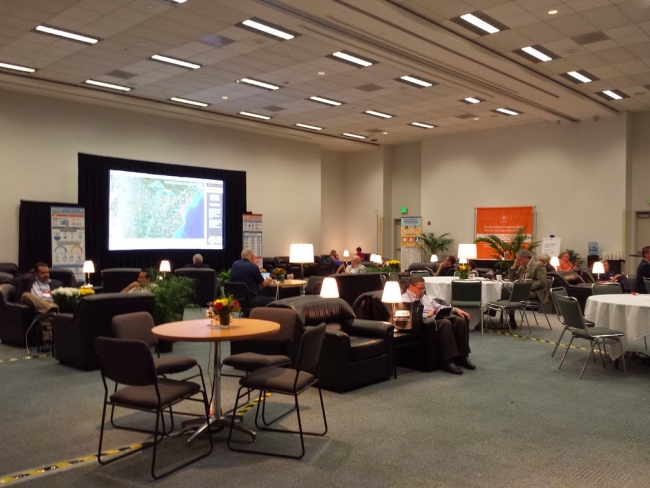You have /5 articles left.
Sign up for a free account or log in.

The CIO lounge at last year's Educause annual conference.
Melissa Woo
Relaxing in the CIO lounge at Educause's annual ed-tech conference last year, A. Michael Berman heard several of his colleagues remark that entering it "felt like you were walking through this curtain into a different world."
The lounge, pictured above, is a quiet space where attendees can escape the buzz of the exhibit hall and back-to-back information sessions -- but only if you have a chief information officer sticker on your nametag. That, Berman said, didn't fit the values of higher education.
“We’re all here to support students on our campuses and support our missions,” Berman, vice president for technology and communication and chief information officer at California State University at Channel Islands, said. “We all like to say we’re one team, but if the team captain gets special treatment that no one else gets, it separates them from everybody else. That doesn’t seem necessary to me.”
Berman wrote down his thoughts in a blog post last week, calling for Educause to ditch the lounge and “[encouraging] the leadership to ask themselves whether it's time to send a different, more inclusive message.”
It’s not as though the lounge is guarded by an Educause bouncer. Yet with a sign that reads “CIO Lounge” flanking the door, the dedicated space “suggests exclusivity,” Berman and other chief information officers argue, thereby shutting out those who hope to learn from veterans in the field. But the debate, which has jumped from Berman's blog to Educause's public chief information officer listserv, is about more than just a room.
The conference, which this year will be held in Orlando, can be “challenging and isolating” for first-timers because of its sheer size, Berman said in an interview. Last year, the conference drew almost 8,000 attendees, most of them IT staffers at various rungs of the hierarchy, information officers, faculty members and vendors.
The CIO lounge was created a few years ago to appeal to the changing needs of a group that Educause depends on attracting in order to host a successful conference -- in part because the vendors who pay big bucks to exhibit and advertise at the meeting want to connect with high-level decision-makers. “If CIOs didn’t come, it would collapse,” Berman said. “I think we all understand that. I’d like to think that most CIOs are not so shallow that they wouldn’t come to the conference if they didn’t get an open seat and a free cookie.”
Responses to Berman’s blog were split. Some, especially established information officers, have acknowledged his point, but say they still prefer having a dedicated space to meet one another. Berman also said many of those in different positions have thanked him for speaking out, saying the criticism “had to come from somebody who’s using the room,” lest it “sound like sour grapes.”
Of course, chief information officers aren’t the only constituency Educause has to cater to when piecing together its flagship event. The conference sections off space for established vendors, and also space for startups. There is a lounge for chief information officers, a lounge for international attendees, a lounge for impromptu meetings, and meeting spaces for members of Educause’s discussion groups. On top of that, the organizers need to ensure the conference is a valuable investment for those attending virtually.
That approach represents Educause’s “wayfinding” strategy, said Diana G. Oblinger, who this year will head to her last annual conference as president.
“What I think the conversation is really evolving toward is a conversation about connections, and that’s one of the things that Educause really does and the conference sort of symbolizes, physically and virtually -- creating connections between people and networking,” Oblinger said.
The organization is still finalizing this year’s program, but in response to the discussion, Oblinger and market manager Lisa Gesner provided some examples of what attendees can expect in Orlando.
As part of the CIO Experience, a networking program, chief information and information security officers will host a conversation about cybersecurity. Another session, co-hosted with the British information and communication technology group Jisc, will attempt to define the future chief information officer.
“The core focus we’re seeing is the need for collaboration within the varying IT organizations -- and across campus,” Gesner said. “Our community has evolved. Their needs and the way they want to interact are more diverse now.”
Some changes may be as simple as adding more stations where attendees can charge their devices. Others involve carefully orchestrating conferences throughout the year to make sure conversations that start at Educause’s regional events are picked back up at the annual conference.
The CIO lounge, however, will likely remain open this year.
“There are so many different opportunities at the annual conference that we try to help people find their way to whatever it is they need or they want from that particular experience,” Oblinger said. “Generally, they want the wayfinding, they want different kinds of sessions ... and they want the ability to connect with people who have different perspectives. At the same time, they want to connect with people who are exactly like them.”








